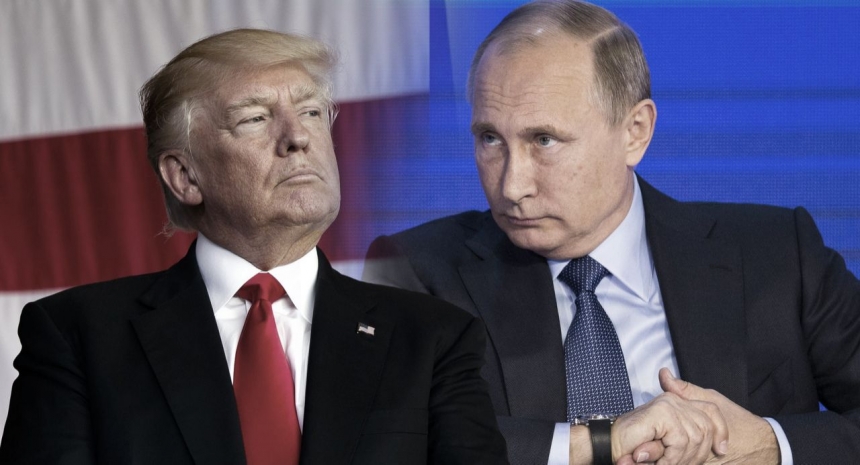"This is a strategy": Media reveal what Trump aims to achieve by 'opening his arms' to Putin.

“This is a strategy”: Media reveals what Trump aims to achieve by “opening his arms” to Putin
Sudden and starkly positive statements from U.S. President Donald Trump regarding Russia and its leader Vladimir Putin are driven by a strategic desire to create a rift between the U.S. and China—two powers that seek to end U.S. international dominance.
According to The Wall Street Journal, experts have already dubbed this attempt as “reverse Nixon.” This refers to the policy of U.S. President Richard Nixon, who, in the early 1970s, altered American policy and moved towards rapprochement with communist China in an effort to deepen the divide between Mao Zedong and the Soviet Union. This choice transformed Cold War geopolitics and laid the groundwork for China’s economic development. Subsequent cooperation between Washington and Beijing contributed to the weakening of the Soviet Union's global influence.
However, separating Russia and China now will not be easy, notes WSJ. The two countries have deepened military and intelligence cooperation and aligned their foreign policies. China provides substantial economic support to Russia, including the supply of computer chips and machinery used in the military industry.
At the same time, by shifting its support to Russia and stepping back from Ukraine, Washington has already alienated its allies in Europe, who are the largest trading partners and primary foreign investors in the U.S. The sudden pivot in American foreign policy may also alarm U.S. partners in Asia.
What is happening now is “the flip side of the reverse Nixon,” says former State Department official Evan Feigenbaum. According to him, Trump “is trying to split the entente between two powers that share ideological proximity and common strategic interests.”
“And what he has done instead is divide the West, while Russia simultaneously unites with both the U.S. and China,” the official notes.
Moreover, besides the rapprochement between Russia and China, the war in Ukraine has strengthened Moscow's alliances with Iran and North Korea. American officials label the emergence of this new axis of autocracies as a strategic threat that will be difficult for U.S. military forces to counter simultaneously, and they assert that Trump’s urgent desire to end the war in Ukraine is driven by the need to weaken, if not break, this united front of adversaries.
What Moscow can offer the U.S.
The publication states that a memo prepared for the Kremlin by an analytical center ahead of negotiations in Saudi Arabia indicated that Moscow proposed to halt cooperation with China on sensitive technological and military issues as part of a deal to end the war in Ukraine on favorable terms for Russia.
Moscow might offer to limit China’s involvement in infrastructure projects that would enhance China’s strategic capabilities. It also suggested a commitment from Russia to restrict the resumption of natural gas exports to Europe to undermine European competitiveness, and allow the sale of American liquefied natural gas, as well as proposals to grant American companies rights to mineral deposits in occupied Ukraine.
Russia can do little to help the U.S. contain China
China already possesses the majority of significant military technologies held by Russia. “That ship has sailed. The Chinese are far more advanced technologically in all types of sectors than the Russians,” said Alina Polyakova, CEO of the Center for European Policy Analysis, a think tank in Washington.
Furthermore, while Russia’s relationship with China is strategic and enduring, any rapprochement with Washington is essentially temporary, at least as long as the U.S. remains a democratic state.
“In the end, in four years, Trump will no longer be in the White House, and Putin must consider the likelihood that the next U.S. administration could just as sharply shift in the opposite direction,” WSJ notes.
“Russia knows that China is its giant neighbor, that the Communist Party of China will rule for as long as Russia can foresee, and that alienation from China poses a deadly threat to Russia,” says Alexander Gabuev, an expert on China-Russia relations and head of the Carnegie Moscow Center.
However, this does not mean that Putin will not seek contact. Trump’s proposals open the prospect of obtaining from Washington what his armies have failed to achieve in three years of war: a regime change in Kyiv and the return of Ukraine, and possibly other parts of Europe, to Moscow's sphere of influence.
“I see no reason why Russia wouldn’t take advantage of everything that Donald Trump is undeservedly offering on a silver platter while maintaining close ties with China,” says Thomas Gomart, director of the French Institute of International Relations.